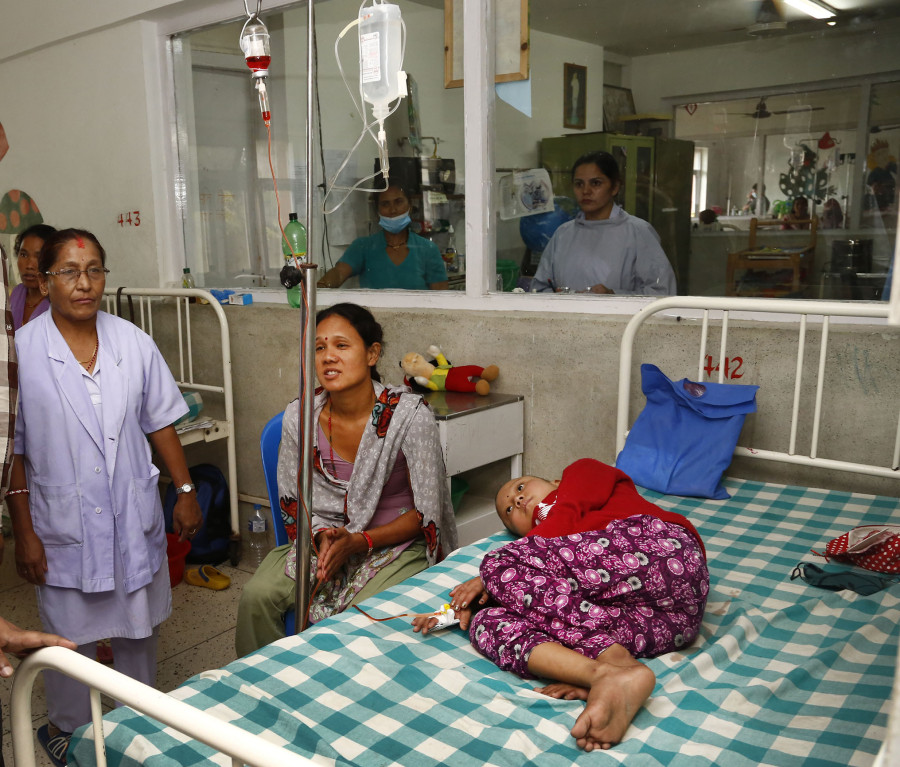National
Hospitals countrywide ailing due to lack of doctors and nurses
Dozens of government-run health facilities across the country are reeling under acute human resource crisis due to which patients have been hit hard.
Arjun Poudel
Dozens of government-run health facilities across the country are reeling under acute human resource crisis due to which patients have been hit hard.
Kanti Children’s Hospital, the only national referral centre for paediatric care, in Kathmandu is one among them.
Every day, around 1,000 people visit the hospital seeking treatment for their children.
But hospital sources said that there is an acute shortage of manpower and equipment to cater to the children in need of treatment.
When the Post reached out to Dr Ganesh Rai, director at Kanti Children Hospital, he appeared to be resigned to the fact that there was nothing he could do.
“A stent was placed in my heart last year. If you inquire about the problems in our hospital, I might suffer another heart attack,” Rai told the Post over the phone when asked about the hospital. “I am ready to step down as the director of the hospital and ready to assist young doctors,” said Rai.
According to Rai, the hospital needs 39 medical officers, 160 nurses and other staff to continue its existing services. Likewise, patients visiting the hospital for ENT and orthopedic services have been forced to seek services at private hospitals.
The hospital withdrew at least 16 ICU beds for the lack of nursing staff.
“We are also facing a shortage of X-ray films and reagents. We have dues to pay and haven’t even been able to pay salary to our staff,” said Rai.
All major hospitals from central to zonal to sub-regional to district level are facing similar problems, according to officials. Mahendra Prasad Shrestha, chief of Health Coordination Division at the Health Ministry, said the government health facilities throughout the country are in need of more than 4,000 doctors and nurses immediately.
Bir Hospital, one of the major government hospitals, in the country needs general physicians, cardiologists, nephrologists, gastroenterologist, neurologists, neurosurgeons, dermatologists, ENT surgeons, urosurgeons, plastic surgeons, cardiothoracic surgeons, pathologists, oncologists, forensic medicine officers, endocrinologists and pulmonologists, among others.
The hospital needs 600 nurses to ensure effective services, but there are only 270, according to the hospital administration.
Bir Hospital had requested the Health Ministry to send over 400 staff—including doctors and nurses—a year ago. But that request is yet to be addressed.
The problem at Tribhuvan University Teaching Hospital is also similar.
“We had demanded for 128 nurses four years ago, but the authority concerned—Institute of Medicine—is yet to address our concerns,” said Dr Prem Krishna Khadka, director at the teaching hospital. Only 10 nurses have been serving in some departments that have as many as 50 beds, which means there are only three nurses to provide service at one time.
The Institute of Medicine, which operates the teaching hospital, said that it has forwarded the hospital’s demand for additional 85 doctors to Tribhuvan University, the parent agency of the institute. But the problem is yet to be addressed.
Some sub-regional hospitals which need an adequate number of consultant doctors are running without even one at present.
For instance, Dadeldhura Sub-regional Hospital, where there are postings of 19 consultant doctors, has been operating without one for the last five years, due to which hundreds of people in the region have been deprived of quality care. The hospital was upgraded as a sub-regional facility five years ago.
Of the 30 staff nurses serving in the hospital, 14 have been transferred and six are on study leave, Dr Jitendra Kandel, medical superintendent at the hospital, told the Post.
“We have no other option but to refer the patients to Dhangadhi and Kathmandu due to lack of consultant doctors at our hospital,” said Kandel.
Some hospitals are operating even without a single nurse.
Dr Jagadish Chandra Bista, chief of Baitadi District Hospital, said that his hospital also does not have nurses to provide nursing care to patients.
“Of the six nurses serving in our hospital, four have been transferred and two are on study leave,” said Dr Bista.
According to officials, Sudurpaschim Province too lacks specialist doctors such as psychiatrists, cardiologists and nephrologists, among others. “Patients dealing with minor mental problems or depression have to go to Kathmandu or India for treatment,” said Dr Gunaraj Awasthi, director of the Regional Health Directorate of Sudurpaschim Province.
Officials at the Health Ministry admit problems are aplenty in the health sector across the country but that their hands are tied. “We are aware of the problems, but we cannot do anything until the employee adjustment process is complete,” said Shrestha, who is also spokesperson for the Health Ministry. “We will open vacancy after the completion of the employee adjustment process.”
Rai of Kanti Children’s Hospital said he was now tired of meeting with bureaucrats and ministers to solve the hospital’s problems.




 22.12°C Kathmandu
22.12°C Kathmandu













